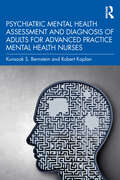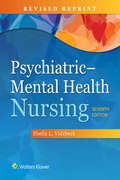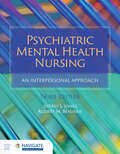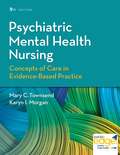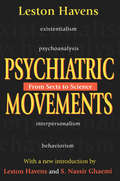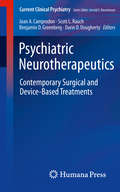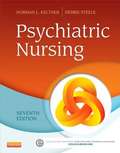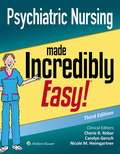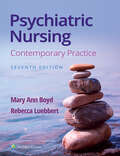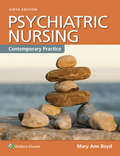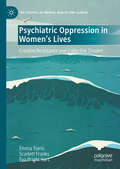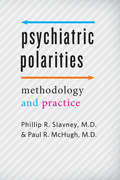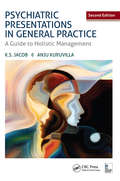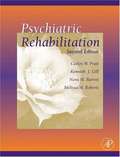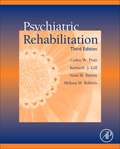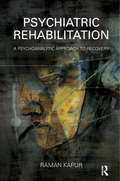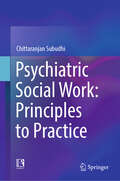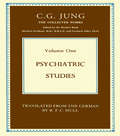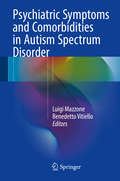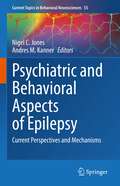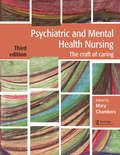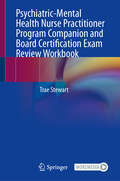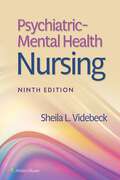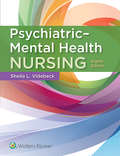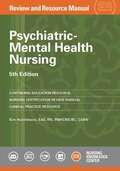- Table View
- List View
Psychiatric Mental Health Assessment and Diagnosis of Adults for Advanced Practice Mental Health Nurses
by Robert Kaplan Kunsook S. BernsteinThis text provides a comprehensive and evidence-based introduction to psychiatric mental health assessment and diagnosis in advanced nursing practice. Taking a clinical, case-based approach, this textbook is designed to support graduate nursing students who are studying psychiatric mental health nursing as they develop their reasoning and decision-making skills. It presents: Therapeutic communication and psychiatric interviewing techniques, alongside basic psychiatric terminologies. The major psychiatric diagnoses, drawing on the DSM-5. A step-by-step guide to conducting a comprehensive psychiatric mental health assessment. Case examples demonstrating assessment across major psychopathologies. Good practice for conducting mental health evaluations. This is an essential text for all those undertaking psychiatric mental health nurse practitioner programs and a valuable reference for advanced practice nurses in clinical practice.
Psychiatric Mental Health Nursing (Coursepoint Ser.)
by Sheila L. VidebeckExploring the full psychiatric nursing curriculum, this student-friendly book focuses on the skills and concepts needed for successful practice. Short concise chapters, an engaging art program, and a direct and personal approach guide students in building therapeutic communication skills within the framework of the nursing process. Access to the online video series, Lippincott Theory to Practice Video Series, provides students with an even deeper understanding of patients experiencing mental health disorders. Doody's Review Service gives this book a Weighted Numerical Score of 90 - 4 Stars! "The book is comprehensive, well written, and full of resources. The Concept Mastery Alerts in the chapters help students focus on critical content. The book is color-coded, making it easy for students to follow the format of each chapter." - Doody's Review Service
Psychiatric Mental Health Nursing: An Interpersonal Approach
by Dr. Jeffrey Jones Dr. Audrey BeauvaisPsychiatric Mental Health Nursing: An Interpersonal Approach, Third Edition is a foundational resource that weaves both the psychodynamic and neurobiological theories into the strategies for nursing interventions.
Psychiatric Mental Health Nursing: Concepts of Care in Evidence-Based Practice
by Mary Townsend Karyn MorganA well-organized, clear, and concise textbook on the basic concepts of psychiatric/mental health nursing. Focusing on holistic nursing, this practical resource can be used by students and nurses alike. Key elements include historic and epidemiologic factors, background assessment data with predisposing factors/symptomatology with each disorder, and much more. Each chapter includes objectives, glossary, case studies, review questions, and other tools. Illustrated.
Psychiatric Movements: From Sects to Science
by Leston HavensIn the early 1970s, the preeminence of psychoanalysis in the treatment of mental illness gave way to a number of other approaches. Yet, rather than practicing in cooperation, the different schools--existentialism, psychoanalysis, interpersonalism, behaviorism--each taught its own methods, convinced it was the true psychiatry. As a result, all too frequently, varieties of psychiatry have come and gone, wallowing in a battle of sects rather than progressing toward knowledge.In Psychiatric Movements, Leston Havens posits that psychiatry must adopt a pluralistic stance, for only an inclusive psychiatry can bridge the traditional scientific quest of medicine with a humanistic interest in whole lives, inner states, and relationships with others. If for no other reason, from an ethical standpoint, the patient should get the treatment he needs, not the one treatment the doctor dispenses. This edition includes a new introduction explaining changes in the field during the last thirty years.
Psychiatric Neurotherapeutics
by Darin D. Dougherty Joan A. Camprodon Scott L. Rauch Benjamin D. GreenbergThis volume covers the gamut of surgical and device-based treatments for psychiatric disorders. Written by experts in the field, this book covers neuroscience advances in the neurobiological underpinnings of psychiatric diseases, emerging surgical and device-based treatments, and advances in the field. Topics include electroconvulsive therapy, transcranial magnetic stimulation, Vagus nerve stimulation (VNS), and many other cutting-edge treatments and techniques. Psychiatric Neurotherapeutics is a valuable resource for psychiatrists, neurosurgeons, neurologists, researchers, and all other medical professionals interested in surgical and device-based treatments of psychiatric disorders.
Psychiatric Nursing (Seventh Edition)
by Norman L. Keltner Debbie Steele<P>Learn the therapeutic skills you need to succeed in the nurse’s role in psychiatric care!<P> Psychiatric Nursing, 7th Edition uses a practical approach to psychotherapeutic management that clearly explains how to manage and treat individuals with psychiatric disorders.<P> It emphasizes the nurse’s three primary tools: you and your relationship with patients, medications, and the environment. <P>This edition adds a new chapter on forensics along with coverage of the latest trends and treatments.<P> Written by educators Norman Keltner and Debbie Steele, this text provides a solid, real-world foundation for the practice of safe and effective psychiatric nursing care.
Psychiatric Nursing Made Incredibly Easy! (Incredibly Easy! Series®)
by Cherie R. Rebar Carolyn J. Gersch Nicole HeimgartnerNeed an insightful, real-world guide to mental health care concepts? The newly updated Psychiatric Nursing made Incredibly Easy, 3rd Edition addresses numerous mental health nursing issues, defining disorders and management strategies and offering down-to-earth guidance on a range of care issues — all in the enjoyable Made Incredibly Easy® style. With guidance that applies to any healthcare setting, this colorfully illustrated guide walks you through the vital skills needed for psychiatric mental health nursing care, offering solid support for being exam-ready and for handling a range of mental health and substance use concerns while on the job.
Psychiatric Nursing: . Contemporary Practice
by Mary Ann Boyd Rebecca LuebbertPsychiatric Nursing: Contemporary Practice, 7th Edition, simplifies your students’ path to success in psychiatric mental health nursing, providing a comprehensive, recovery framework approach that emphasizes interventions and wellness promotion to ensure positive patient outcomes. This trusted, up-to-date text makes complex concepts easy to understand and incorporates a wealth of examples, case studies, clinical vignettes, and patient experience videos to help students confidently apply what they’ve learned in the clinical setting.
Psychiatric Nursing: Contemporary Practice (Coursepoint+ Ser.)
by Mary Ann BoydPsychiatric Nursing: Contemporary Practice 6th edition provides instructors and students a comprehensive, recovery model approach to psychiatric mental health nursing. Mary Ann Boyd presents complex concepts in an easy-to-understand language with case studies, clinical vignettes, and patient experience videos for students to practice and apply psychiatric mental health content.
Psychiatric Oppression in Women's Lives: Creative Resistance and Collective Dissent (The Politics of Mental Health and Illness)
by Emma Tseris Scarlett Franks Eva Bright HartThis book provides a comprehensive analysis of women's experiences within mental health services, demonstrating the need for a radical paradigm shift in how women's distress and experiences are understood. Drawing on extensive fieldwork on coercive mental health treatment, including interviews, participatory action research, arts-based research, and public sociology, the book centres the knowledge, skills, and creativity of psychiatrised women. Informed by intersectional feminism and critical mental health theory, the book explores the interlocking oppressions of psychiatric harm and patriarchal power, alongside women's survivorship and resistances. Areas covered include the pathologisation of women's emotions within mental health services, violence and deprivations in involuntary treatment, the surveillance of mothering, and social exclusions arising from psychiatric diagnoses. The book highlights the ability of collective and creative research processes to move beyond the task of documenting psychiatric harm, towards imagining rich alternatives to biomedical, therapeutic, and carceral practices in mental health. It offers a critique of the notions of ‘benevolence’ and ‘expertise’, which are commonly used to justify psychiatric coercion. It will appeal to students and scholars working across the fields of critical mental health, sociology, social work, psychiatry, mental health nursing and gender studies. Emma Tseris is senior lecturer in Social Work and Policy Studies at the University of Sydney, Australia, researching feminist and critical mental health theory. She is the author of Trauma, Women's Mental Health and Social Justice: Pitfalls and Possibilities (2019) and co-author of Using Social Research for Social Justice (2023). Scarlett Franks is a survivor researcher from the University of Sydney, Australia, who also serves on the Survivor College of the National Centre for Action on Child Sexual Abuse, the board of directors of the Grace Tame Foundation, and the Advisory Panel of the NSW Office of the Anti-Slavery Commissioner. Eva Bright Hart is a feminist survivor researcher from the University of Sydney, Australia. She is a senior social worker and public health professional from a rural area. Eva is also known as a mother, teacher, gardener, cook, author, activist and artist. As a survivor of psychiatric and gendered violence Eva uses a protective pseudonym so she can contribute without the fear of further discrimination, disablement and involuntary psychiatric treatment for herself and her family. Eva means "living one".
Psychiatric Polarities: Methodology and Practice
by Phillip R. Slavney Paul R. McHughA lively exploration of mind and brain, conscious and unconscious, patient and client.In this companion volume to their widely acclaimed Perspectives of Psychiatry, Phillip R. Slavney, M.D., and Paul R. McHugh, M.D., argue that the discontinuity of brain and mind is the source of much of psychiatry’s discord, for it leads psychiatrists to think about their discipline in terms of polar opposites: conscious or unconscious; explanation or understanding; paternalism or autonomy. Psychiatric Polarities brings together the history of ideas and such clinical issues as suicide and bipolar disorder to identify, describe, and debate these and other polar oppositions that arise from psychiatry’s inherent ambiguity.There is no single conceptual perspective that is sufficient for all of psychiatry’s concerns, Slavney and McHugh observe, yet it is both possible and necessary to transcend the denominational conflicts that plague the field. In Psychiatric Polarities, their examination of these conflicts demonstrates how a methodological approach can help to resolve disagreements rooted in partisan commitments.
Psychiatric Presentations in General Practice: A Guide to Holistic Management, Second Edition
by K. S. Jacob Anju KuruvillaMedical schools currently use specialist perspectives on psychiatric disorders to train physicians, nurses and health professionals. This results in a lack confidence among non-psychiatric health professionals, which reduces their ability to manage common mental health conditions in primary care and secondary hospitals. This book is a practical guide to common mental health conditions encountered in general medical practice.
Psychiatric Rehabilitation (2nd edition)
by Carlos W. Pratt Kenneth J. Gill Nora M. Barrett Melissa M. RobertsPsychiatric rehabilitation refers to community treatment of people with mental disorders. Community treatment has recently become far more widespread due to deinstitutionalization at government facilities.
Psychiatric Rehabilitation 3rd Edition
by Carlos W. Pratt Kenneth J. Gill Nora M. Barrett Melissa M. RobertsThe third edition of Psychiatric Rehabilitation, discusses interventions to help individuals with mental illness improve the quality of their life, achieve goals, and increase opportunities for community integration.
Psychiatric Rehabilitation: A Psychoanalytic Approach to Recovery
by Raman KapurRecovering from severe mental illness is one of the most terrifying human experiences in health care. Often conventional rehabilitation approaches focus on helping the patient with his or her symptoms and maximising the external world through supportive interventions. However, often little attention is paid to the internal world of the patient. This subjective experience of recovery is the focus of this book. It describes a particular psychoanalytic model that best captures this distressful state of mind and suggests particular processes that have to be put in place to ensure the patient gets the best opportunity to have his or her fears and hopes addressed. The book also addresses "real world" issues such as management, leadership and training, as well as highlighting key research findings from relevant studies. Outcome measures are suggested that could be adopted to measure the benefits of this particular approach. The chapters give many clinical, organisational and research descriptions from the real world of psychiatry and social care.
Psychiatric Social Work: Principles to Practice
by Chittaranjan SubudhiThis textbook, Psychiatric Social Work: Principles to Practice, provides a comprehensive foundation for understanding social work’s generalist practice in mental health care. It synthesizes historical and contemporary perspectives into a structured sequence. It addresses key topics such as mental health as a global issue, the importance of psychiatric social work, classifications and assessment of mental disorders and theoretical approaches. It also focuses on models and strategies used in psycho-social rehabilitation, community mental health, and therapeutic communities. Chapter-end questions enhance understanding, while the text combines fresh research with evidence-based practice to promote inclusive development for people with mental illness. The book is an essential read for scholars, educators, researchers, field practitioners, and students of social work, psychiatric nursing, public health, health psychology, and community medicine. It is also invaluable for public health institutions, paramedical staff, health workers, policymakers, and advocacy groups.
Psychiatric Studies: Experiments In The Diagnosis Of Psychopathological Conditions Carried Out At The Psychiatric Clinic Of The University Of Zurich (classic Reprint) (Collected Works of C.G. Jung #No. 20)
by C.G. JungAt the turn of the last century C.G. Jung began his career as a psychiatrist. During the next decade, three men whose names are famous in the annals of medical psychology influenced his professional development: Pierre Janet, under whom he studied at the Sappetriere Hospital in Paris; Eugen Bleuler, his chief at the Burgholzli Mental Hospital in Zurick; and Sigmund Frued, whom Jung met in 1907. It is Bleuler, and to a lesser extent Janet, whose influence is to be found in the descriptive experimental psychiatry composing Volume I of the Collected Works. These papers appeared between 1902 and 1905l most of them are now being published in English for the first time. The volume opens with Jung's dissertation for the medical degree: 'On the Psychology and Pathology of So-Called Occult Phenomena', a study that foreshadows much of his later work, and as such is indispensable to all serious students of his work. It is the detailed analysis of the case of an hysterical adolescent girl who professed to be a medium. The volume also includes papers on cryptomnesia, hysterical parapraxes in reading, manic mood disorder, simulated insanity, and other subjects.
Psychiatric Symptoms and Comorbidities in Autism Spectrum Disorder
by Luigi Mazzone Benedetto VitielloThis book explains in detail the diagnosis, management, and treatment of comorbid disorders in patients with autism spectrum disorders (ASD). Important insights are provided into the nature of the symptoms of psychiatric comorbidities in these patients, and particularly children and adolescents, with a view to assisting clinicians in reaching a correct diagnosis that will permit the implementation of appropriate treatment strategies, whether psychological or pharmacological. The full range of potential comorbidities is considered, including mood disorders, anxiety disorders, obsessive-compulsive disorder, schizophrenia spectrum and other psychotic disorders, eating disorders, disruptive behavioral disorders, Tourette's disorder, and substance-related disorders. In each case guidance is provided on how to avoid incorrectly attributing symptoms to ASD and on treatment options. Psychiatric Comorbidities in Autism Spectrum Disorders will be of value to all practitioners who are confronted by patients with these complex co-occurring conditions.
Psychiatric and Behavioral Aspects of Epilepsy: Current Perspectives and Mechanisms (Current Topics in Behavioral Neurosciences #55)
by Andres M. Kanner Nigel C. JonesMany people living with epilepsy also suffer from debilitating psychiatric and cognitive disorders. While these comorbidities have been recognized for centuries, their causation, and relationship to the epilepsy remains clouded in mystery. This volume highlights recent knowledge and findings as well as controversies in our current understanding of behavioral and psychiatric comorbidities of epilepsy.
Psychiatric and Mental Health Nursing: The craft of caring
by Mary ChambersThis new edition of a bestselling, evidence-based textbook provides a comprehensive overview of psychiatric and mental health nursing. Keeping service users and their recovery at the centre of care, the holistic approach will help nurses to gain the tools and understanding required to work in this complex area. Extensively updated for this new edition, the text looks at: Aspects of mental health nursing: covering topics such as ethics, developing therapeutic relationships and supervision. The foundations of mental health nursing: discussing diagnosis, assessment and risk. Caring for those experiencing mental health distress: looking at wide range of troubles including anxiety, bipolar disorder, eating disorders and issues around sexuality and gender. Care planning and approaches to therapeutic practice: exploring ideas, pathways and treatments such as recovery, CBT, psychodynamic therapies and psychopharmacology. Services and support for those with mental health distress: covering topics such as collaborative work, involvement of service users and their families and carers, and a range of different mental healthcare settings. Mental health nursing in the twenty-first century: highlighting emerging and future trends including the political landscape, physical health and health promotion, and technological advances. This accessible and comprehensive textbook integrates service user perspectives throughout and includes student-friendly features such as learning outcomes, key points summaries, reflection points and further reading sections. It is an essential resource for all mental health nursing students, as well as an invaluable reference for practising nurses.
Psychiatric-Mental Health Nurse Practitioner Program Companion and Board Certification Exam Review Workbook
by Trae StewartEvery year, nearly 5,000 US psychiatric-mental health nurse practitioners (PMHNP) sit for the ANCC board exam. Upon passing, PMHNPs become board-certified and eligible for licensure in their respective states, as well as eligible to apply for a DEA license to write prescriptions. However, the extensive content covered on the board exam often exceeds what is taught in Master's of Science in Nursing programs tailored for PMHNPs. Suitable for both PMHNP students and advanced nurses preparing for board certification, this PMHNP Program Companion and Review Workbook serve as a comprehensive guide from Day 1 of the PMHNP program through exam preparation. The book is structured logically, progressing from fundamental nursing topics (e.g., lab values, ethics, public health) to psychiatric-mental health specific content (e.g., assessment and diagnosis, major psychiatric disorders, psychopharmacology, therapeutic modalities). Additionally, it covers essential advanced practice nursing areas like leadership, quality improvement, and biostatistics. What sets this workbook apart is its interactive approach to learning. Through charts, tables, fill-in-the-blanks, matching exercises, and mnemonics, learners actively engage with the material. Answers and explanations are provided for all practice activities, ensuring comprehension and retention. Moreover, the accompanying Springer Nature Flashcard app offers almost 2,000 practice test questions, allowing learners to access study material conveniently on-the-go via their phone, tablet, or computer. It's an engaging and effective method to reinforce learning. The PMHNP Program Companion and Review Workbook is an invaluable resource for anyone pursuing excellence in psychiatric-mental health nursing practice. Test your knowledge with questions and answers about the book in the Springer Nature Flashcards app.
Psychiatric-Mental Health Nursing
by Sheila L. VidebeckPresenting a practical, student-friendly approach to essential skills and concepts, Psychiatric–Mental Health Nursing, 9th Edition, helps students confidently build a foundation for successful practice. Short chapters and a succinct, straightforward writing style make challenging concepts accessible, and entertaining cartoons and built-in study guide tools engage students while reinforcing their understanding. This thoroughly updated edition reflects the latest evidence-based information and an enhanced focus on clinical judgment to help students master specific nursing interventions, hone their therapeutic communication skills, and effectively apply concepts in any care setting.
Psychiatric-Mental Health Nursing (Coursepoint Ser.)
by Shelia VidebeckA Practical Focus on the Skills and Concepts Essential to Your Success With an accessible, clear and student-friendly approach, Psychiatric-Mental Health Nursing clarifies challenging concepts and helps you build a foundation for working successfully with clients experiencing mental health challenges regardless of care setting. The text explores the full spectrum of psychiatric nursing, helping you master specific nursing interventions, hone your therapeutic communication skills and learn to apply content effectively within the framework of the nursing process. New! Unfolding Patient Stories written by the National League for Nursing put the nursing process in a realistic context to prepare you for successful client interactions and interventions. Clinical Vignettes familiarize you with the features of major disorders you are likely to encounter in practice. Therapeutic Dialogues help you perfect your communication skills with specific examples of nurse-client interactions. Best Practice boxes provide the latest evidence-based findings in psychiatric nursing. Self-Awareness features foster your personal and professional development through self-reflection. Concept Mastery Alerts clarify important concepts essential to your classroom and clinical success. Watch and Learn icons point you to corresponding true-to-life Lippincott® Theory to Practice Video Series videos for a richer understanding of important mental health disorders. Built-In Study Guide reinforces your understanding with multiple-choice questions, multiple-response questions and clinical examples at the end of each chapter. Nursing Care Plans demonstrate effective approaches for addressing specific client disorders. Drug Alerts highlight essential concerns related to psychotropic drugs. Warning boxes alert you to FDA considerations for specific medications. Cultural Considerations help you ensure culturally sensitive care for a wide range of client populations. Elder Considerations sections prepare you to care for the growing population of older adults. Client/Family Education boxes boost your teaching capabilities. Nursing Interventions etail key treatment strategies for specific disorders. DSM-5 Diagnostic Criteria boxes summarize the medical diagnostic features of specific disorders.
Psychiatric-mental Health Nursing Review And Resource Manual, 5th Ed
by Kim HutchinsonAre you looking into how to advance your professional development through certification? Need a reliable and credible reference resource? No matter where you are in the process, make sure you have the most valuable review and resource tool at your disposal. The Nursing Knowledge Center’s Psychiatric-Mental Health Nursing Review and Resource Manual is a must-have tool for nurses planning to take the American Nurses Credentialing Center’s (ANCC’s) Psychiatric-Mental Health Nursing certification exam. Based on the official ANCC certification exam test content outline, this review and resource manual will help you: -Study and analyze comprehensive material and concepts written by nursing experts. -Develop a recommended seven-step plan to equip you for the exam and map out what to do on the day of the exam. -Prepare for and familiarize yourself with psychiatric-mental health nursing standards of practice. -And much more ... Make the Psychiatric-Mental Health Nursing Review and Resource Manual a key resource in your certification preparation.
